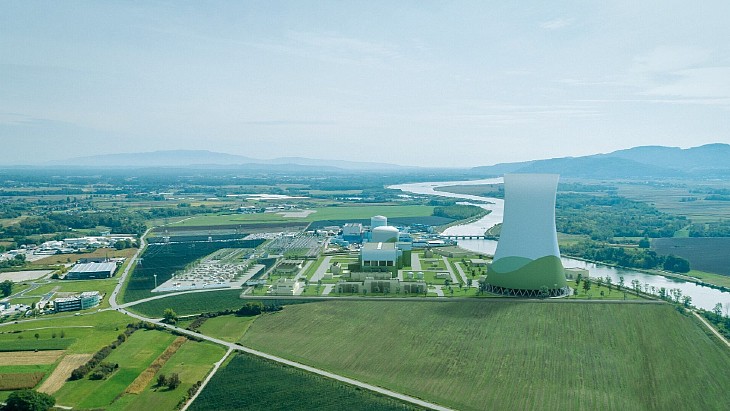Slovenia aiming for referendum on new nuclear this year
31 January 2024
Prime Minister Robert Golob has said that a cross-party summit has agreed on the need for both renewables and nuclear energy as part of the "path to a carbon-free future".
 How JEK2 could look, alongside the existing Krško plant (Image: GEN/JEK2)
How JEK2 could look, alongside the existing Krško plant (Image: GEN/JEK2)Those attending the meeting included Slovenia's President Nataša Pirc Musar, the President of the National Assembly Urško Klakočar Zupančič, the President of the National Council Marko Lotrič and the presidents of parliamentary parties in the country.
A referendum has already been pledged on the proposed new nuclear capacity at the Krško plant and Golob said all the parties agreed on holding a vote. "So far, we are leaning towards holding the referendum in the second half of the year, there is no final date yet. We will continue to discuss this issue," he said, adding that the referendum would "decide whether we want nuclear energy to remain part of Slovenia's future" as well as the construction of the second block at Krško.
He said those attending had agreed to work together on the wording of the referendum question. "In my opinion, there is a sincere willingness of all five parliamentary parties to find a question on which we will agree," he said.
Holding the referendum sooner rather than later was important for ensuring the speed of the development, with the aim of a final investment decision in 2027 or 2028 and the new capacity online in the 2030s. Those attending had also agreed to consider ways of expediting the legislative process relating to the new unit, the prime minister's office said.
Slovenia has plans to build a new nuclear power plant - the JEK2 project - with up to 2400 MW capacity next to its existing nuclear power plant, Krško, a 696 MWe pressurised water reactor which generates about one-third of the country's electricity and which is co-owned by neighbouring Croatia.
A working group of Slovenian government ministers and industry officials was established in September with the aim of speeding up the implementation of the project and preparing "all the necessary bases for citizens to make high-quality and informed decisions" about it in a referendum which the government says is needed for the project to happen. Earlier this month the country's main opposition party proposed an early consultative referendum on the project and the prospect of small modular reactors elsewhere in the country.
In October, GEN Energy CEO Dejan Paravan said there were three technology providers being considered for the project - Westinghouse, EDF and Korea Hydro & Nuclear Power - who all had strengths and "the decision will not be easy".
Researched and written by World Nuclear News
No comments:
Post a Comment